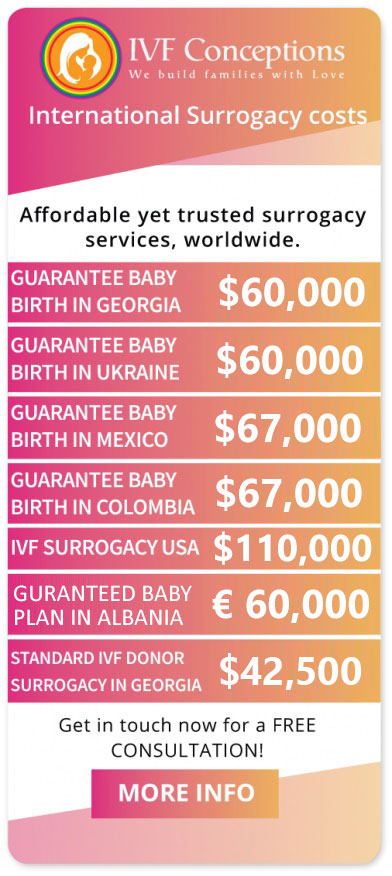
Surrogacy has long been a controversial topic, with many debating its ethical implications and impact on traditional notions of parenthood. However, in recent years, a new demographic has emerged as potential candidates for surrogacy: single parents. In this article, we will delve into the complexities of surrogacy for single parents, exploring the reasons behind this growing trend, the challenges they may face, and the legal and ethical considerations that come into play.
Traditionally, surrogacy has been seen as an option for couples struggling with infertility, but with the rise of single parenthood and changing societal norms, more and more single individuals are considering surrogacy as a path to parenthood. This development raises important questions about the legality, feasibility, and morality of surrogacy for single parents.
More resources for gay surrogacy:
Surrogacy options for same-sex couples
Affordable gay surrogacy destinations
LGBT-friendly surrogacy agencies
 Introduction
Introduction
Surrogacy, as defined by the American Society for Reproductive Medicine, is a method of assisted reproduction where a woman carries a pregnancy for another individual or couple, known as the intended parents.
While surrogacy has traditionally been associated with couples facing fertility challenges, there has been a noticeable increase in the number of single individuals choosing surrogacy as a path to parenthood.
Single parent surrogacy holds significant importance for those who, due to various circumstances, wish to experience the joys of parenthood and create a loving family of their own. This growing trend is a testament to the changing dynamics of family structures and the increasing acceptance of diverse parenting options in society.
Understanding Single-Parent Surrogacy
Exploring the motivations behind single individuals choosing surrogacy as a means of building their families reveals a range of deeply personal reasons. Some may have faced fertility challenges or medical conditions that make traditional pregnancy impossible, while others may have chosen to focus on their careers or personal growth before pursuing parenthood.
For many single parents, surrogacy represents a conscious decision to fulfill their desire for a child and provide a loving and nurturing environment. However, embarking on the surrogacy journey as a single parent can bring about unique emotional and logistical challenges. The absence of a partner to share the responsibilities and decision-making process can feel overwhelming at times.
Additionally, the financial costs associated with surrogacy can place a significant burden on a single parent’s resources. Single parents must have robust support systems in place, including friends, family, and professional networks, to assist and guide them throughout the surrogacy process. Access to resources such as counseling, legal advice, and educational materials can also be invaluable, helping single parents navigate the emotional complexities and legal intricacies that arise during this transformative journey.
The surrogacy process takes 18 months to 24 months depending upon the individual circumstances
Outlines the surrogacy process timeline for intended parents:
| Stage | Description of Stage | Duration |
| Research Phase | Explore family building options and decide on surrogacy. | Personal timeframe |
| Consultation and Application | Choose a surrogacy agency, sign agreement, and start embryo creation (if needed). | 1-3 Months |
| Matching | Agency finds and presents potential gestational carriers. Meet and decide on a match. | 3-6 Months |
| Medical Screening and Contracts | Carrier undergoes medical and psychological screening. Sign surrogacy contract. | 1-2 Months |
| Embryo Transfer | Prepare for embryo transfer. Success may take multiple attempts. | 1-1.5 Months |
| Pregnancy | Gestational carrier’s pregnancy, approximately 40 weeks. | 9-10 Months |
| Birth and Postpartum | Baby’s birth, establish parental rights, and postpartum period. | 1.5-3 Months |
Please keep in mind that the durations mentioned in the table are approximate and can vary depending on individual circumstances and other factors. Always consult with a reputable surrogacy agency or professional to get personalized guidance throughout the surrogacy journey.
Legal Considerations for Single-Parent Surrogacy
 When entering into the realm of surrogacy as a single parent, it is essential to navigate the complex legal landscape surrounding this process. The legality of single-parent surrogacy varies across countries, with some nations embracing and regulating it, while others have restrictive policies or outright bans. Understanding the legal framework is crucial for single parents seeking to embark on their surrogacy journey.
When entering into the realm of surrogacy as a single parent, it is essential to navigate the complex legal landscape surrounding this process. The legality of single-parent surrogacy varies across countries, with some nations embracing and regulating it, while others have restrictive policies or outright bans. Understanding the legal framework is crucial for single parents seeking to embark on their surrogacy journey.
In countries where single parent surrogacy is legally permitted, individuals can find support and guidance throughout the process. These countries recognize and protect the rights of single parents to engage in surrogacy arrangements, ensuring legal safeguards for all parties involved. By providing an overview of the legal landscape, prospective single parents can make informed decisions regarding the best jurisdiction for their surrogacy journey. Furthermore, exploring the legal rights and responsibilities of single parents and surrogates in these countries is essential. Clarity on parental rights, custody, and visitation arrangements is crucial to ensure a smooth transition into parenthood. Additionally, it is vital to understand the surrogate’s rights and protections, ensuring fair compensation, healthcare, and emotional support throughout the surrogacy process. By thoroughly examining the legal considerations surrounding single parent surrogacy, individuals can navigate the complexities and make informed decisions that align with their desires and legal rights.
Seeking professional legal counsel and staying informed about the evolving legal landscape is paramount to ensure a successful and legally protected surrogacy journey for single parents.
Single Parent Surrogacy Cost
 Embarking on a surrogacy journey as a single parent involves careful consideration of the financial implications involved. The cost factors in single parent surrogacy are the same as couples and vary depending on various factors such as the chosen surrogacy agency, location, medical expenses, legal fees, and other associated costs.
Embarking on a surrogacy journey as a single parent involves careful consideration of the financial implications involved. The cost factors in single parent surrogacy are the same as couples and vary depending on various factors such as the chosen surrogacy agency, location, medical expenses, legal fees, and other associated costs.
Single parents need to understand that surrogacy can be a significant financial investment. The expenses associated with fertility treatments, surrogate compensation, medical screenings, legal agreements, and prenatal care can quickly add up. Additionally, international surrogacy may incur additional costs such as travel expenses and accommodation. This financial burden can present challenges for single parents considering surrogacy, as it requires careful financial planning and budgeting. However, it is crucial to note that financial assistance options and resources are available to support single parents on this journey.
Some surrogacy agencies offer financial programs or payment plans to help alleviate the upfront costs. Single parents should explore these options and discuss them with their chosen agency. Additionally, some organizations and foundations provide grants and scholarships specifically for individuals pursuing surrogacy as single parents.
The cost of single-parent surrogacy is between $150,000 to $200,000 in the USA. If you are looking for international surrogacy then this cost may be less than 50%. In countries like Mexico, Argentina, and Colombia, which allow single parent surrogacy the cost of cost guranted baby program is $70,000.
Seeking guidance from financial advisors experienced in surrogacy can also be beneficial in understanding the costs involved and developing a comprehensive financial plan. They can provide insights and strategies to manage expenses effectively and navigate potential challenges.
Single Parent Surrogacy Legal Countries
When considering surrogacy as a single parent, it is essential to explore the legal framework surrounding the practice. Surrogacy laws vary from country to country, and it is crucial to choose a destination where single-parent surrogacy is legally recognized and supported.
Several countries have established legal systems that allow single parents to pursue surrogacy. Mexico, Colombia, and Argentina for instance, have become popular destinations for single parent surrogacy, with their clear legal framework that acknowledges and protects the rights of intended parents. Other countries such as the United States, Canada, and the UK also have legal systems in place that permit single parents to pursue surrogacy arrangements ( but mostly altruistic).
However, it is important to note that each country may have specific requirements and restrictions for single-parent surrogacy. It is advisable to consult with legal professionals who specialize in reproductive law to ensure compliance with the laws of the chosen destination.
By choosing a country with supportive legal regulations, single parents can navigate the surrogacy process with confidence and peace of mind. It is essential to understand the legalities involved and work with professionals experienced in surrogacy law to ensure a smooth and legally sound journey. Contact us to know about your specific case and we can guide and assist you in affordable and secure surrogacy solutions, globally. Surrogacy costs resources worldwide:
Top 4 cheapest countries for surrogacy
Best Countries for Surrogacy 2023- Top International Destinations
Risks of international surrogacy
Global International Surrogacy Options
IVF Conceptions Surrogacy Prices & Plans ( in 2023) Low-cost surrogate mother in Argentina Low-cost surrogate mother in Kazakhstan
Conclusion
In conclusion, surrogacy can be a viable option for single individuals who wish to become parents. While it may present its own unique set of challenges, it has been a successful and fulfilling journey for many single parents.
With the help of a reputable and experienced surrogacy agency, single individuals can build their dream family and experience the joys of parenthood. It is a personal decision that requires careful consideration and preparation, but for those who are determined to become parents, surrogacy can be a wonderful opportunity to make their dream a reality.
If you’d like to learn more about IVF, Egg Donation, or surrogacy services globally, check out the rest of our website at IVF Conceptions. We offer legally secure and affordable surrogacy consulting services for FREE.
Our team has over 13 years of experience facilitating surrogacy arrangements, egg donation, and serving as an advocacy resource for infertile couples and LGBTQ individuals seeking to build families. Our founder and chief surrogacy consultant, Neelam Chhagani, passionately helps couples struggling with fertility challenges. Since starting our surrogacy consulting agency in 2013, we’ve helped welcome over 500 babies for intended parents nationwide. Our team includes experts from diverse backgrounds with leading reproductive attorneys, professionally trained top fertility doctors, former surrogacy case managers, experienced and kind surrogate mother and egg donor coordinators, mental health professionals specializing in infertility counseling, and a logistic support team to assist you in your chosen surrogacy country.
FAQ
What are the legal and ethical considerations surrounding surrogacy for single parents?
The legal and ethical considerations surrounding surrogacy for single parents vary depending on the jurisdiction. In some countries, surrogacy is strictly regulated or even prohibited for single individuals, while in others it is allowed.
The primary legal concern is ensuring that the rights and well-being of all parties involved, including the surrogate, the intended parent, and the child, are protected. Ethically, questions arise about the potential exploitation of surrogates and the psychological and emotional implications for the child. It is important to have comprehensive laws and ethical guidelines in place to address these concerns and ensure the best interests of all involved.
How does the process of finding a surrogate differ for single parents compared to couples?
The process of finding a surrogate can differ for single parents compared to couples in several ways. For single parents, there may be additional legal and social considerations to navigate, such as the need to establish legal parenthood and potential societal stigma. Single parents may also face challenges in finding a surrogate who is comfortable working with a single parent, as some surrogates may prefer to work with couples. Additionally, single parents may have to rely on additional support systems, such as family or friends, to provide emotional and practical support throughout the surrogacy journey.
What are some of the unique challenges that single parents may face during the surrogacy journey?
Single parents may face unique challenges during the surrogacy journey, such as finding a surrogate who is comfortable working with a single parent, navigating legal and financial aspects without a partner, and managing the emotional and logistical demands of the process alone. Additionally, single parents may encounter societal stigma and judgment regarding their decision to pursue surrogacy as a single individual. It is important for single parents to have a strong support system in place and to work closely with a reputable surrogacy agency to navigate these challenges successfully.
Are there any specific requirements or restrictions for single parents looking to pursue surrogacy?
The specific requirements or restrictions for single parents looking to pursue surrogacy may vary depending on the country, state, or surrogacy agency involved. In some jurisdictions, single parents may face additional legal or social challenges compared to couples. Some countries or agencies may require that the intended parent be in a stable financial, emotional, and social situation, while others may have restrictions based on age or marital status. It is important for single parents considering surrogacy to thoroughly research and consult with legal and reproductive professionals to understand the specific requirements and restrictions that may apply to them.

 Introduction
Introduction